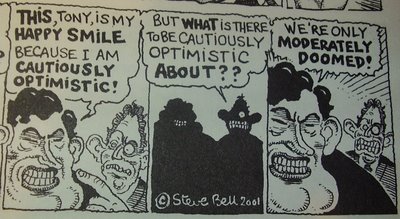How to legitimise the BNP.
 The British National Party must be delighted with Margaret Hodge. Last year she helped the party to one of its biggest successes in its history, grabbing 11 seats on the Barking and Dagenham council (all in Barking, which seems appropriate) after she said they were going to make a major breakthrough - and surprise, surprise, they did, once the media had predictably descended into the area. The party even thanked her personally after their victory, with Richard Barnbrook, the BNP London spokesman commenting that if he'd given her a million pounds he couldn't have asked her to do more.
The British National Party must be delighted with Margaret Hodge. Last year she helped the party to one of its biggest successes in its history, grabbing 11 seats on the Barking and Dagenham council (all in Barking, which seems appropriate) after she said they were going to make a major breakthrough - and surprise, surprise, they did, once the media had predictably descended into the area. The party even thanked her personally after their victory, with Richard Barnbrook, the BNP London spokesman commenting that if he'd given her a million pounds he couldn't have asked her to do more.Yesterday, for reasons known only to herself, she was at it again. In a lecturing Observer article titled "To my fellow immigrants", as Hodge herself was born in Egypt to Jewish parents who were German refugees, she has a go at debating the merits and downsides of migration. Almost inevitably, she stumbled straight into the trap of legitimising one of the BNP's most popular myths: that migrant families are being put before those who have lived here for generations.
We prioritise the needs of an individual migrant family over the entitlement others feel they have. So a recently arrived family with four or five children living in a damp and overcrowded, privately rented flat with the children suffering from asthma will usually get priority over a family with less housing need who have lived in the area for three generations and are stuck at home with the grandparents.
This is to an extent true. Those whose needs are considered greatest are put towards the top of the list for council homes in Barking and Dagenham, in a somewhat recent change from the previous scheme by the council. When it actually comes down to this being put into practice however, as the figures produced by Downing Street when questioned about it show, only 1% of lettings in 2005-06 went to foreign nationals, amounting to around 1,100 homes in a year.
The damage though is already done. As Hodge should well know, the media and the BNP both love to pounce on any potential playing of the race card, and when a minister says something along the lines of immigrants are getting all the bloody houses and this has got to be stopped, however crude an extrapolation of her article that is, it's the proverbial manna from heaven. The item on tonight's Ten O'Clock News couldn't have provided a better piece of propaganda for the party, as the hack interviewed a Polish migrant who could hardly speak English who was eager to get on the council waiting list, then a long time resident in the same circumstances who claimed that he'd on the list for 11 years who'd been informed it was all down to the immigrants by the BNP councillor, followed by Richard Barnbrook, allowed a completely free ride to preach the BNP's usual invective of mistruths. The facts that asylum seekers have no access to council housing and that foreign migrants have very limited access to benefits, with only a tiny number claiming them, as was previously revealed, were strangely absent.
The other point, as has been made, is that New Labour has been utterly woeful at providing new council homes in the first place. With the right to buy being promoted just as much as it was under the Tories, the stock simply hasn't been replaced, leaving families to fight over an ever dwindling amount of places. It's therefore of little surprise that desperate times have called for the desperate measure of instituting whose need is the greatest rather than who has been on the list the longest; as with most grievances, legitimate or otherwise, this is then picked up on and blown out of all proportion for political ends.
Hence the Tory spokesman Damian Green jumping at the chance to say how the Tories would impose an annual limit on migrants, even though it has very little to nothing to do with the housing shortage experienced especially in the south, for which his party shares a decent amount of blame for helping start in the first place. We can expect the press to jump at the opportunity to do the same thing: when Jack Straw made his comments on the veil, within days the Express was screaming to ban it and the Sun was printing lies about non-existent Muslim yobs damaging the homes of soldiers.
As Nancy Kelly of the Refugee Council said, the way to tackle the BNP is not to take their lead. Giving them the opportunity to say I told you so without pointing out their lies, making clear how their councillors fail miserably and that their "solution" is mainly to send 'em all back isn't just stupid, it's suicidal, but it seems that Margaret Hodge has already realised that her political career is at an end, or if it isn't, it should be.
Related posts:
Lenin's Tomb - Labour's racist housing argument
Blood & Treasure - Village wisdom
Pickled Politics - Margaret Hodge’s disgusting duplicity
Labels: BNP, housing, immigration, Margaret Hodge


